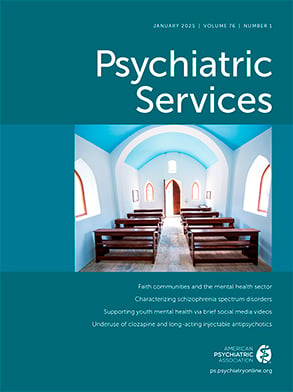We agree with Dr. Wintersteen regarding the importance of universal depression screening in the community setting, consistent with the U.S. Preventive Services Task Force (USPSTF) guidelines, when appropriate systems are in place to provide accurate diagnosis, effective treatment, and follow-up. Given the lack of incentives for provision of mental health screenings (
1), the intent of our research effort was not to discourage depression screening but rather to document and highlight the additional time demands of important, recommended screening practices and raise awareness among key stakeholders. Our findings also highlight the need for more definitive screening intervals in the USPSTF guidelines to assist with the interpretation of the observed occurrence of depression screening at 3.4% of patient visits. Although we attempted to reduce potential bias by excluding visits in which the patient saw a mid-level practitioner (that is, a physician assistant or nurse practitioner), the study data did not allow for exclusion of cases in which a nurse administered the screening instrument before physician evaluation. As noted in our article, the effect of screening by nurses may have resulted in a slight underestimate in the overall probability of depression screening.
Given the high prevalence (
2) and related morbidity of depression (
3), it is unfortunate that the potential of longer patient visits may discourage some physicians from using depression screening tools. Therefore, we believe that the findings of our study should motivate health care payers, providers, and policy makers to develop mechanisms that increase the efficiency of universal depression screening practices.
In our recently published study of variations in the probability of depression screening (
4), we found a significant increase in the odds of documented depression screening for visits by patients who had a current or prior diagnosis of depression. This finding is consistent with Dr. Wintersteen's assertion that primary care providers may be using targeted screening for patients at higher risk. In practice settings that routinely screen patients for depression, this process may be very efficient. However, settings that do not routinely perform depression screening may have suboptimal implementation, which may lengthen patient visits. Although we have found depression screening to be associated with increased visit duration, it is also likely that additional time burden is incurred after the act of screening itself (for example, investigating the results of a positive finding or attempting to explain a negative finding).
Our belief is that expanded use of technology and alternative health care providers, working in collaboration with physicians, will facilitate greater provision of depression screening services in the community given appropriate financial incentives. A paradigm shift is needed in the way that the health care system values depression screening efforts. Thus, although our findings may discourage some physicians from screening for depression, our greater hope is that information from our research will be used to justify the need for systems change to expand depression screening to all patients.

